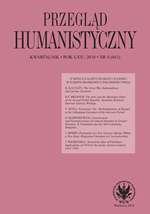The Jews and the Messianic Ethos of the Second Polish Republic. Stanisław Rembek’s Interwar Literary Writings
The Jews and the Messianic Ethos of the Second Polish Republic. Stanisław Rembek’s Interwar Literary Writings
Author(s): Rachel Feldhay BrennerSubject(s): History, Anthropology, Social Sciences, Language and Literature Studies, Cultural history, Studies of Literature, Cultural Anthropology / Ethnology
Published by: Wydawnictwa Uniwersytetu Warszawskiego
Keywords: national ethos; patriotism; grace; chosenness; Elijah
Summary/Abstract: Rembek’s conviction of Polish “chosenness” is expressed in the characterizations ofthe Jewish protagonists in his fiction. While Rembek’s diaristic writing reveals his anti-Semitic prejudices, in his novella Dojrzałe kłosy [Ripe spikes], and novel Nagan [Revolver]he portrays the Jews as patriotic officers fighting for Poland. These characterizations ofthe Jews highlighted Poland’s democratic open-mindedness toward its Jewish citizens.Nonetheless, as Jews they were excluded from the nation’s Christian destiny. Time andagain, the Jewish officers in Rembek’s fiction articulate their despondency over their failureto accept Christ despite their irresistible attraction to the Christian faith. The failure pointsto their inability to achieve grace. Their sense of religious inadequacy elucidates a theologicalperspective which posits that a Jewish presence was indispensable to Poland’s redemptivedestiny; the Jew as an affirming witness sanctioned the Polish claim to a messianic calling.To achieve legitimacy, the Polish national messianic mission needed to be acknowledged byJews. The perspective in Rembek’s fiction illuminates an important facet in the complexityof the Polish-Jewish relationships in reborn Poland.
Journal: Przegląd Humanistyczny
- Issue Year: 463/2018
- Issue No: 4
- Page Range: 23-30
- Page Count: 8
- Language: English
- Content File-PDF

